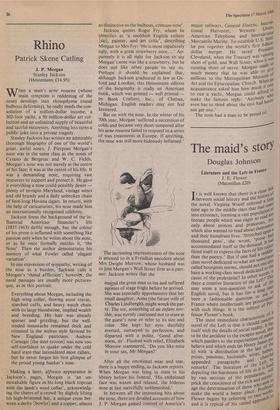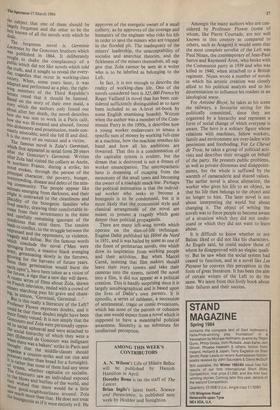The maid's storY
Douglas Johnson
Literature and the Left in France J. E. Flower (Macmillan £20) It is well known that there is a close f 'between social history and the historYP, the novel. Virginia Woolf referred a l0_11; time ago to the middle class that had c°'""f into existence, forming a vast poPolatil3not literate people which was eager to read 114)t only about princes and princesses, Tb„,us which also wanted to read about thernse''"3 and their humdrum lives. 'Stretched oPc)krIgt thousand pens', she wrote, `prose "-d accommodated itself to the demand' it then fitted itself to express the facts of life fiddle.. than the poetry.' But if one had a nii,"imes class novel dedicated to what are soote'ciso called bourgeois norms, should not °Ile-the have a working-class novel dedicated to is cause of the proletariat? In other Ny°,,cci,Ths' is there a creative literature of the Left:i. the may seem a non-question to ask °` time English novel, but it has for a long t' to been a fashionable question to ask ied France where intellectuals are pre°ccupPro- with such things. It is the subject °'r fessor Flower's book.
fthththe has
itselfn o Tveh which panders realitY. Itto to be the antidote to the escapist riovce,loge- lewoimost immediate characteristic of..ria the detailshiiissetoehxfapst oeiccttiaashti joourilsciccn believe and which ends (as Henry Janle; the it) with 'a distribution at the last f,bies, prizes, pensions, husbands, wives, cheerful appended paragraphs and ,c!ift by remarks'. The literature of the Left, depicting the harshness of life as it JS by vast sections of the poPolat,i°„'cour prick the conscience of the rich and e"etic to age the determination of those wh° seek make the world a better place. Pr°.,,orys, Flowe begins by referring to two to and itr is typical of his varied aPProa the subject that one of them should be largely forgotten and the other to be the best known of all the novels with which he deals.
, The forgotten novel is Germinie Lacerteux by the Goncourt brothers which was published in 1864. It deliberately sought to shake the complacency of a Public which did not like novels which told the truth, and it sought to reveal the every- day tragedies that occur in working-class society. When, some years later, it was adapted and performed as a play, the right-
members of the Third Republic's Senate voted that it should be banned. Rased on the story of their own maid, a story which the authors only found out
habout after her death, the novel describes ow she was sent to work in a Paris cafe, w she was ill-treated and abused, forced into dishonesty and prostitution, made con- stantly miserable, until she fell ill and died. It is the story of an outcast and a victim. The famous novel is Zola's Germinal, Which first appeared in serial form 20 years after the Goncourt's Germinie. Written after Zola had visited the colliery at Anzin, in northern France, during a strike, his novel evokes, through the person of the Principal character, the poverty, hunger, overcrowding, disease and debts of the min- mg comunity. The people appear like alt animals em merging from darkness, and their
gin is contrasted to the cleanliness and Placidity of the bourgeois families who ilivednearb, g co y drawing their comfortable in- me from their investments in the mine and carefully remaining ignorant of the
conditions that exist there. The tension leads to conflict, to the struggle between the oppressed and the oppressors, to violence, tragedy and defeat. But the famous words which conclude the novel ('Men were skinging forth, a massive black avenging artily, germinating slowly in the furrows, ,I.owing for the harvests of future years. 'Don their germination would burst the ettairth °Pen'), have been taken as a vision of A e future, a sign that a new day will dawn. recent series of films about Zola, shown On French television, ended with a crowd of ?niners marching past his grave and chant- ing, in unison, 'Germinal, Germinal...
Rut is this really a literature of the Left.
Y Flower expresses doubts, and it could be that these doubts might have been 'Wore firmly voiced. It is not simply that the ',911courts and Zola were personally oppos- 121c.Q to social upheaval and were attached to e social hierarchy of which they were a „.Pa,_rt (Edmond de Goncourt was indignant ;nett there was a bakers' strike in Paris and onr°1-ight that the middle-classes should 110ganise a counter-strike and eat rice and .tatoes rather than bread for a fortnight). to js rather that none of them had any sense .rth system
whether capitalist or socialist.
to tehourts saw an individual exposed the blows and buffets of the world, and 41'07 Wished that there would be a little sawre good-neighbourliness around. Zola the ktnuch more than that. He does not treat '-'°urgeoisie as if it were entirely evil. He
approves of the energetic owner of a small colliery, as he approves of the courage and humanity of the engineer who risks his life in order to save the miners who are trapped in the flooded pit. The inadequacy of the miners' leadership, the unacceptability of socialist and anarchist theories, and the fickleness of the miners themselves, all sug- gest that Zola cannot be seen as a writer who is to be labelled as belonging to the Left.
In fact, it is not enough to describe the reality of working-class life. One of the novels considered here is 325,000 Francs by Roger Vailland (a novel that has been con- sidered sufficiently distinguished as to have been included as an A-level set-book by some English examining boards). Written when the author was a member of the Com- munist Party in the 1950s, it describes how a young worker endeavours to amass a specific sum of money by working full-time at a machine, how the machine smashes his hand and how all his ambitions are thwarted. That this is a condemnation of the capitalist system is evident, but the dream that is destroyed is not a dream of worker emancipation. The unsympathetic hero is dreaming of escaping from the monotony of the small town and becoming the owner of a roadside snack-bar. Perhaps the political insinuation is that the individ- ual worker who seeks to become a bourgeois is to be condemned, but it is more likely that the economical style and classical arrangement of the novel are meant to present a tragedy which goes deeper than political propaganda.
There are many left-wing novels which operate on the slice-of-life technique. Eugene Dabit published his Hotel du Nord in 1931, and it was hailed by some as one of the finest of proletarian novels, one which drew its inspiration from working people and their activities. But when Marcel Carne, insisting that film makers should leave their ivory towers and take their cameras into the streets, turned the novel into a film, it did not appear as a political creation. This is hardly surprising since it is largely autobiographical and is based upon the lives of Dabit's own parents. It is episodic, a series of tableaux, a succession of sentimental, tragic or comic evocations, which has none of the pattern or cohesion that one would expect from a novel which is supposed to have a meaningful political awareness. Sincerity is no substitute for intellectual perception.
Amongst the many authors who are con- sidered by Professor Flower (some of whom, like Pierre Courtade, are not well known in this country as compared to others, such as Aragon) it would seem that the most complete novelist of the Left was Paul Nizan, the contemporary of Jean-Paul Sartre and Raymond Aron, who broke with the Communist party in 1939 and who was killed in 1940, when attached to a British regiment. Nizan wrote a number of novels in which his artistic creation was closely allied to his political analysis and to his determination to influence his readers in an ideological sense.
For Antoine Bloye, he takes as his scene the railways, a favourite setting for the politically committed, since they are organised by a hierarchy and represent a form of social change of which everyone is aware. The hero is a solitary figure whose relations with machines, fellow workers, family and environment are over-laden with pessimism and foreboding. For Le Cheval de Troie, he takes a group of political acti- vists and describes their struggle on behalf of the party. He presents public problems, as well as private dilemmas and disappoint- ments, but the whole is suffused by the warmth of camaraderie and shared values. The earlier novel is about alienation, the worker who gives his life to an object, so that his life then belongs to the object and no longer to him. The later novel is not about interpreting the world but about changing it. The object of writing the novels was to force people to become aware of a situation which they did not under- stand or which they did not want to learn about.
It is difficult to know whether or not Balzac liked or did not like his characters. As Engels said, he could endow those of whom he disapproved with an elegiac quali- ty. But he saw when the social system had ceased to function, and in a novel like Les Paysans he conveys this perception in the form of great literature. It has been the aim of certain writers of the Left to do the same. We learn from this lively book about their failures and their success.















































 Previous page
Previous page